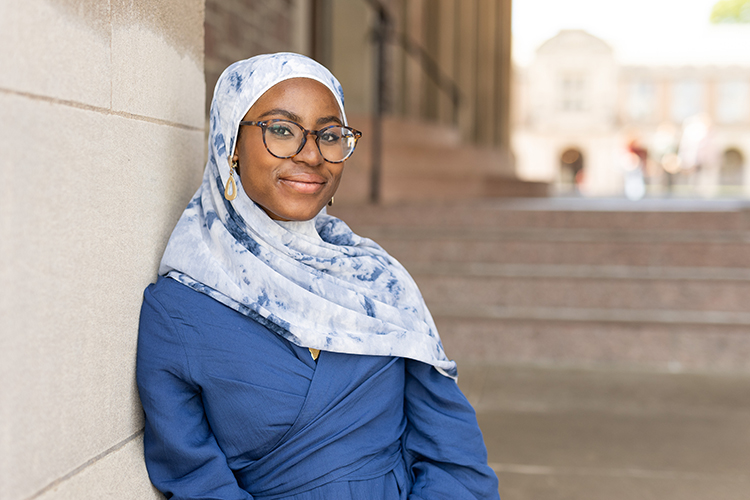
One of the earliest memories Aisha Adedayo has from childhood is when her mother asked her to go down the street from their family compound in Ibadan, Nigeria to fetch water so she could handwash the family’s clothing.
“This is just one of many memories I have of my parents doing what they had to do to get by,” said Adedayo, a senior majoring in Educational Studies with a double minor in African & African American Studies and Organizational Behavior.
Adedayo migrated from Nigeria with her parents to the United States when she was six. They were selected for the Green Card Lottery and settled in the Minneapolis area. While her parents held degrees in Nigeria, their credentials didn’t hold the same merit in the US, so they had to start their educational journeys all over again.
“For a very significant portion of my childhood, up until sophomore year of high school actually, my parents were in school too,” she said. “So, going to college was absolutely an expectation growing up.”
For a very significant portion of my childhood, up until sophomore year of high school actually, my parents were in school too. So, going to college was absolutely an expectation growing up.
Adedayo said that while her public high school in the north St. Paul area was greatly under-resourced, she sought to take advantage of every opportunity she could so she could attend a top university. She had her sights set on WashU, and she got accepted, but it wasn’t that easy.
Her financial aid package wouldn’t cover the cost to attend WashU and she didn’t have enough scholarship funding either. Then, the COVID-19 pandemic hit, and about 15 minutes from where she lived, George Floyd was murdered. Like most of the country, Adedayo needed a moment to process.
“When that all happened, I was so emotionally overwhelmed that it was hard for me to stay on task with academics, but it drew me to be part of something bigger and to be part of a movement to use my voice to inspire and empower others however I could.”
With her sights still on WashU, Adedayo joined the Army National Guard and took a gap year for bootcamp and advanced training to become a mental health technician. While enlisting in the armed forces wasn’t exactly part of her plan, and posed safety concerns for her parents, she said that it was an opportunity to afford to come to WashU and a milestone in her personal self-development.
“My identity as a Black Muslim woman was a very big concern for me and my family going into the military,” she said. “I prepared myself as best I could and even kept with me a signed memorandum from the Governor of Minnesota indicating it was ok for me to wear my hijab. That was new to the Army – wearing a hijab in uniform.”
My identity as a Black Muslim woman was a very big concern for me and my family going into the military. I prepared myself as best I could and even kept with me a signed memorandum from the Governor of Minnesota indicating it was ok for me to wear my hijab. That was new to the Army – wearing a hijab in uniform.
Adedayo said it was a challenge securing accommodations to wear the hijab and tend to her five daily prayers. However, her drill sergeant was actually one of her biggest supporters, but told her she would have to work harder than the other trainees so there wasn’t an impression of her being treated differently than the others.
“I knew I had to work 10 times harder than the other trainees, which was unsurprising because my parents prepared me for that all my life,” she said. “I’ve always felt like I had something to prove and to do that, really hard work is required.”
Now in her final year at WashU, Adedayo hopes she can be a source of inspiration and empowerment for her Muslim and Nigerian communities at home and wants to give back to the communities who made her who she is.
“My purpose has always been to inspire and empower people, especially Black and low-income youth,” she said. “I feel drawn to education policy and community-centered research because of my lived experiences and interests. I’m still navigating what that looks like career-wise, but I see future Aisha as a scholar and entrepreneur.”
Having a WashU degree means giving me the privilege of choice because I think a lot of decisions in my life until now have come from a place of necessity rather than passion. I look forward to more fully discovering and articulating my passions.
Following her undergraduate degree, Adedayo intends to continue her education, most likely with a master’s degree followed by a PhD.
“Having a WashU degree means giving me the privilege of choice because I think a lot of decisions in my life until now have come from a place of necessity rather than passion,” she said. “I look forward to more fully discovering and articulating my passions.”
On campus, Adedayo is involved as a Resident Advisor for Thomas H. Eliot Residential Community and a Research Assistant with Dr. Chris Rozek’s Student Emotions & Belonging lab in the Department of Educational Psychology. Outside of campus, she is a Behavioral Health Specialist for the U.S. Army National Guard, and she runs a photography company, Narative Portraits LLC, that specializes in affordable professional graduation portraits that capture the essence of marginalized people.
“The biggest lesson I’ve learned at WashU is that focusing on what you should do holds you back from what you were meant to do!” she said.